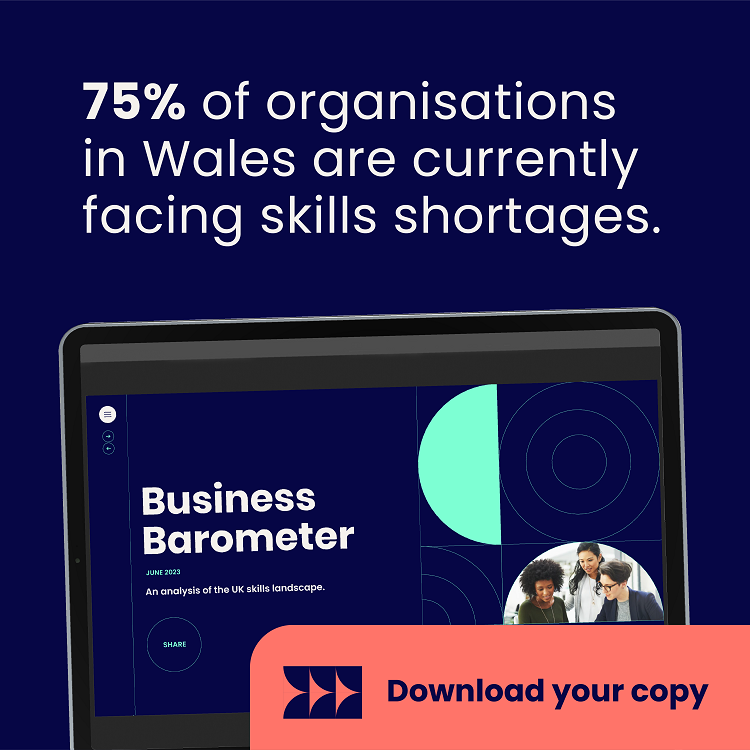This year’s Business Barometer report published by The Open University and the British Chamber of Commerce shows that three quarters (75%) of Welsh business leaders are still experiencing skills shortages, a statistic unwavering since last year’s report findings.
The annual report, which provides a temperature check on the UK skills landscape and surveys 130 Welsh employers, also highlights growing concern for staff morale and wellbeing in Wales, with almost three quarters (70%) of employers in Wales reporting an increase in workload for existing staff.

The report suggests that employers must now rely on the opportunity to ‘grow your own’ talent during a time where nearly one third (29%) of employers in Wales have been prevented from hiring new staff due to candidates’ lack of suitability and overall lack of applicants (43%).
Despite the ongoing skills crisis, the Open University’s 2023 report, published for the second consecutive year in partnership with the British Chambers of Commerce, indicates a concerning plateau in the lack of action taken by employers to tackle the issue of skills shortages negatively affecting staff wellbeing.
The report found more than one third (34%) of organisation leaders in Wales have not implemented any written or annual plans to tackle the national skills shortage in the past year. This is significantly lower than last year when almost half (52%) of Welsh employers confirmed to have implemented some form of written plan around recruitment, training, addressing skills shortages, ESG or D&I.
In Wales, the OU has recently developed a series of free bilingual courses on hybrid working on its OpenLearn site. These are aimed at organisations and their staff, and give guidance on how workplaces can adapt following the coronavirus pandemic.
Despite around two-fifths of Welsh businesses agreeing to increase staff training and investment in 2022, almost 2 in 5 (38%) of organisations in Wales still don’t have specific initiatives, skills programs or workplace adjustments in place to tackle the ongoing issue one year onwards.
Rhys Griffiths, Business Relationship Manager at The Open University in Wales said:
“As in previous years, we’re seeing employers in Wales point to the skills shortage as a major challenge. Many employers and education providers are coming together to address these challenges – for example through Regional Skills Partnerships – to tackle the skills gap, and these findings show that we need to continue to work towards meeting the skills needs of Wales. The cost-of-living crisis means employers are having to do more with less, which is what makes collaboration so important.
At the OU, we’ve introduced new free hybrid working courses to help decision makers and employees alike adapt to the post-covid business landscape. We’re also offering more non-traditional courses such as degree apprenticeships and microcredentials, which businesses can use as part of their strategy, particularly where there is a focus on work-based learning and the application of newly acquired skills and knowledge.”
By continuing to avoid investing and implementing training programs and plans, Welsh employers will continue to face plunging outputs and reduced employee activity recorded by over half (51%) of respondents.
One-third (35%) of organisation leaders have seen an increase in the number of employees over the age of 50 in the last three years. With 27% of employees leaving the workforce to retire, the threat of an ageing workforce retiring without skilled employees to replace them is a key concern.
The latest report places employers’ opportunity to ‘grow your own talent’ among current employees as the key to the continual recruitment and retention challenges facing Wales. Findings suggest that employers are already looking to short courses (88%) and mentoring and support (39%) to upskill their workforce in the coming twelve months.
By implementing these workplace initiatives, skills programs and/or workplace adjustments, employers can utilise the skills harnessed by their existing workforce to solve skill shortages, hiring barriers, age diversity, workplace satisfaction and staff wellbeing in one fell swoop.
Baroness Martha Lane Fox CBE, Chancellor at The Open University and President of the British Chambers of Commerce commented:
“It’s clear from this year’s Business Barometer report that the skills shortage has not improved, despite the existing efforts from organisations across the UK. We haven’t solved it yet.
“But what is even more concerning is that organisations aren’t investing in specific talent pools, including underrepresented groups. If organisations continue to ignore these workers, they risk missing out on untapped talent and deepening the skills gap even further.
“There could be a big opportunity for employers here if hidden talent is given a boost.”








